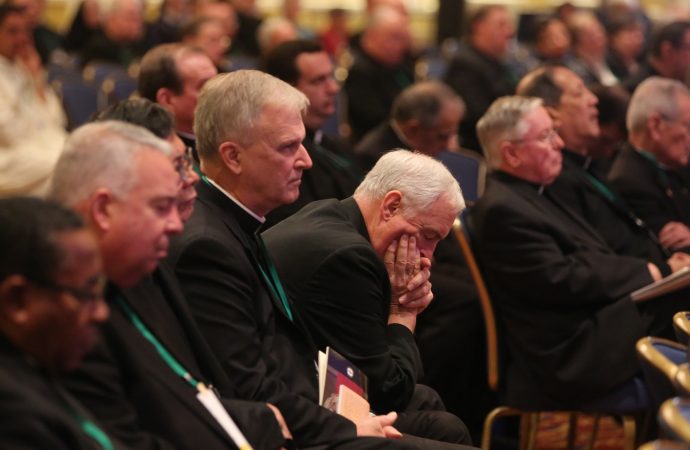As the United States Conference of Catholic Bishops (USCCB) attempted to salvage its agenda following Monday’s news that the Vatican had requested a postponement of a vote on new measures of bishop accountability, Tuesday’s meeting began with a critical assessment of the current state of transparency and reform.
While praising the U.S. bishops for making substantial process since the 2002 passage of its Charter for the Protection of Children and Young People, head of the National Review Board, Dr. Francesco Cesareo, told the bishops “your response to this crisis has been incomplete.”
Cesareo specifically cited the lack of transparency of past cases of abuse and the lack of accountability of bishops.
“It has taken the intervention of the state and the media to fully expose the darkness of abuse in our dioceses,” he chided.
“Today, the faithful and the clergy do not trust many of you. They are angry and frustrated, no longer satisfied with words and even with prayer,” he continued. “They seek action that signals a cultural change from the leadership of the Church.”
Cesareo went on to recommend a full review of all diocesan files dating back to 1950, with lay and independent oversight, and making those findings public.
Further, the National Review Board endorsed a full investigation into former Cardinal Theodore McCarrick and his rise to power within the Church despite decades of serially abusing seminarians and, at least in one case, a minor.
While Pope Francis has declined to authorize a Vatican investigation into the matter, as previously requested by USCCB president Cardinal Daniel DiNardo, an investigation is still expected to occur within the four dioceses in which McCarrick served.
In addition, the Board announced their support of a third-party reporting mechanism for claims against bishops and a new code of conduct for bishops.
“More than new national policies and procedures, it will be your individual decisions and actions, with the support and involvement of the laity that will ultimately restore the Church and bring healing and justice for survivors of abuse,” he said.
At the start of Tuesday’s session, Bishop Earl Boyea of Lansing proposed that the USCCB discuss the possibility of a statement to Francis requesting that he release all evidence and documentation of McCarrick.
The bishops passed the proposal by a verbal consensus vote.
A report was also made by the National Advisory Council - a 48-member group that advises the USCCB’s administrative committee - that also offered their support for a full investigation into the McCarrick saga.
Colonel Anita Raines, a member of the board called for a renewed commitment to “prophetic” lives of chastity, noting that every diocesan employee is expected is sign a code of conduct.
“More, not less, should be expected of bishops,” she urged.
When the U.S. bishops convene on Tuesday afternoon, they will hold a much-anticipated open discussion on the clerical sexual abuse crisis and the proposed standards for bishop accountability that were previously slated for a Wednesday vote, but now delayed until Francis convenes a global summit on sex abuse in Rome in February.

